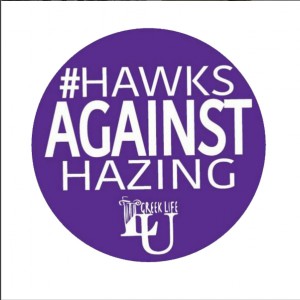
Courtesy of Lehigh Panhel Instagram
The Hawks Against Hazing campaign has been expanded to the month of February to promote the elimination of hazing in Greek and non-Greek organizations.
Run by the Panhellenic judicial board committee, the campaign was a week long in past years. This year, the program is comprised of three phases: awareness, prevention and intervention. Carly Daitch, ’16, Panhel’s vice president of judicial affairs, led the revamped initiative.
Lehigh defines hazing as “any action taken or situation created, whether on or off campus, to produce mental or physical discomfort, embarrassment, harassment, or ridicule.”
Nine out of 10 students who are being hazed do not recognize the act as hazing, according the Lehigh’s Student Affairs webpage about hazing.
According to the Lehigh Hazing Assessment from 2012, 75 percent of respondents said hazing was “definitely” or “probably” occurring on campus. Of those who responded to the survey, over 80 percent said hazing constitutes: deprivation of beverage or food by others, deprivation of sleep by others, consumption of substances not intended for eating or drinking, forced consumption of alcohol and/or other drugs, kidnapping or abandonment of members, engaging in or simulating sexual acts, being paddled, whipped, beaten or kicked, being tied up, taped or confined in small spaces or rooms and destroying or stealing property.
The Hawks Against Hazing initiative is the only anti-hazing event that Panhel participates in each year. Daitch said hazing on Lehigh’s campus is less of a problem compared to past years, but is still a problem that needs to be addressed.
On Feb. 16, the initiative started the program with the awareness phase, which is a social media campaign to raise awareness about hazing through Facebook, Instagram and Snapchat. Posters are urged to caption images with #HawksAgainstHazing.
“It’s encouraging students to bond with their friends, to show that there’s other bonding activities besides hazing that will bring people closer together,” Daitch said.
She believes organizations should outwardly show positive support for members of their organization.
Members of the Panhellenic judicial and executive board are using pop culture references in pictures and creating images with short facts and hazing statistics.
“(Daitch) asked each of us on the committee to make funny photo posts that she has been posting on the Lehigh Panhellenic Instagram and Facebook page to promote awareness against hazing,” said Sara Mason, ’17, who serves on the Judicial Board.
The board members aimed to make the posts comical and eye catching by using memes or pictures that would draw a follower’s attention, according to Kallyse Duddlesten, Pi Beta Phi’s representative on the judicial board.
Duddlesten said the board would like all members of the Lehigh community to post pictures of them having fun and not hazing.
The prevention phase will begin this week. With the assistance of Peer Health Advisers, Daitch worked to create awareness by making short video clips of members from Panhel, the Peer Health Advisors and students who pledge to find ways to stop hazing.
“I’ve been taking videos of people holding up ‘I pledge’ signs to promise kindness and friendship,” Daitch said.
Daitch has also been in contact with the Student Senate, Marching 97, the Office of Fraternity and Sorority Affairs and University Communications to help get the video out to appropriate parties.
“We’re trying to make it not gender specific, but for the entire campus,” Daitch said.
While she believes it is more difficult to reach male students via social media, she hopes to get them involved by participating in the videos.
The board plans to post the videos on March 1. The third phase, known as the intervention phase, will begin at the end of the week. This phase will be kept under wraps, according to Daitch.
“We want to build recognition for what people do in a non-hazing environment and get people to recognize what they can do as an alternative for hazing,” Duddlesten said.





Comment policy
Comments posted to The Brown and White website are reviewed by a moderator before being approved. Incendiary speech or harassing language, including comments targeted at individuals, may be deemed unacceptable and not published. Spam and other soliciting will also be declined.
The Brown and White also reserves the right to not publish entirely anonymous comments.